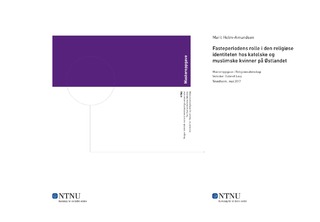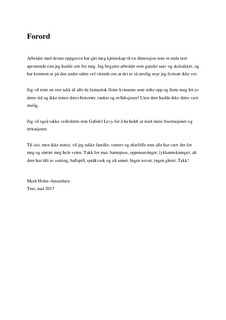| dc.description.abstract | The research problem to be addressed in this thesis is “How does the religion’s and the fasting period’s traditions and values influence the religious identities of women? How do they engage with their religious practices in their everyday life? The case of Muslim and Catholic women in Eastern parts of Norway who exercise traditional periods of fasting.” This thesis takes a closer look on how the traditions of Ramadan and Lent influence the identities of religious women in the Eastern parts of Norway, and how they fit their religion into their daily life. I’ve interviewed four women from each religion, using semi-structured interviews. The book Ramadan – a Swedish tradition, where Swedish researchers have interviewed Swedish Muslims in various stages of life about how they perform Ramadan, has been used here as a starting point for conducting this thesis. I have chosen to analyze my findings using Clifford Geertz’ theory seeing religion as a cultural system. This theory which looks at religion as a system of symbols that influence the individuals in it is useful in this context, and some of the respondents spoke about how they at times had problems separating cultural and religious traditions. Geertz’ conceptions are complemented by Eriksons conceptualization of identity. In my study, I found that there are some inherent contradictions in religious practice for my eight respondents. The respondents highlight that their religiosity is something that they value greatly, while some also feel that they to some extent neglect religion in their daily lives. The fasting periods allow them to connect more both with the religion and God, but also with their families, communities, and themselves. The respondents describe their religious identity and emphasize how their religious upbringing has given them a set of values that they cannot imagine themselves without. It is also important for them to keep their own religion, some were unconcerned about a future partner’s religion as long as they were allowed to keep theirs. An interview of 30-45 minutes cannot possibly uncover the whole specter of a person’s identity, however does it grant insights into some aspects of how the respondent constructs her identity and what her values are. | nb_NO |

